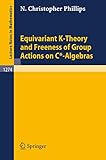Equivariant K-Theory and Freeness of Group Actions on C*-Algebras [electronic resource] / by N. Christopher Phillips.
Material type: TextSeries: Lecture Notes in Mathematics ; 1274Publisher: Berlin, Heidelberg : Springer Berlin Heidelberg : Imprint: Springer, 1987Description: X, 374 p. online resourceContent type:
TextSeries: Lecture Notes in Mathematics ; 1274Publisher: Berlin, Heidelberg : Springer Berlin Heidelberg : Imprint: Springer, 1987Description: X, 374 p. online resourceContent type: - text
- computer
- online resource
- 9783540478683
- 514.2 23
- QA612-612.8
Introduction: The commutative case -- Equivariant K-theory of C*-algebras -- to equivariant KK-theory -- Basic properties of K-freeness -- Subgroups -- Tensor products -- K-freeness, saturation, and the strong connes spectrum -- Type I algebras -- AF algebras.
Freeness of an action of a compact Lie group on a compact Hausdorff space is equivalent to a simple condition on the corresponding equivariant K-theory. This fact can be regarded as a theorem on actions on a commutative C*-algebra, namely the algebra of continuous complex-valued functions on the space. The successes of "noncommutative topology" suggest that one should try to generalize this result to actions on arbitrary C*-algebras. Lacking an appropriate definition of a free action on a C*-algebra, one is led instead to the study of actions satisfying conditions on equivariant K-theory - in the cases of spaces, simply freeness. The first third of this book is a detailed exposition of equivariant K-theory and KK-theory, assuming only a general knowledge of C*-algebras and some ordinary K-theory. It continues with the author's research on K-theoretic freeness of actions. It is shown that many properties of freeness generalize, while others do not, and that certain forms of K-theoretic freeness are related to other noncommutative measures of freeness, such as the Connes spectrum. The implications of K-theoretic freeness for actions on type I and AF algebras are also examined, and in these cases K-theoretic freeness is characterized analytically.


There are no comments on this title.